There is no doubt that the COVID-19 pandemic has done significant damage to the UK’s economy. Almost one million jobs have been lost and the Chancellor has told MPs that the government has spent some £280 billion to support jobs and services.
With the vaccine programme apparently moving quickly, we can at least look forward to beginning to power-up the economy.
And one proposal from our UK government to do this is the 130% super-deduction capital allowance announced as part of the budget.

How does the Super Deduction scheme work?
The scheme began on April 1 and will run until March 31, 2023. It means that companies investing in qualifying plant and machinery will be able to claim a 130% super-deduction capital allowance on main-rate assets and a 50% first-year allowance for qualifying special-rate assets, including long-life assets. Also, the threshold for the Annual Investment Allowance has been raised to £1 million until 1st January 2022. More government information on these schemes, including a super-deduction fact sheet, are available at https://www.gov.uk/guidance/super-deduction. In addition to VAT deferral scheme, COVID-19 disruption loan, and furlough scheme, the two-year business tax cut will help business to invest, grow and support jobs in the UK.
The scheme only covers new equipment and does not cover instances where the commitment to buy has been made before March 31 this year. Some have expressed disappointment in the duration of the scheme, which lasts for two years. on the other hand, corporation tax will increase to 25% by 2023, which will mean that amount of relief available then will be very close to the super-deduction on offer today.
Should UK companies embark on a spending spree?
There are arguments on both sides about how effective the scheme will be. Does it mean companies should embark on a spending spree? Some would say the best time to be brave is when others are being cautious. Investing in extra capacity or newer equipment to improve productivity, while there are favourable tax incentives, may deliver a competitive advantage. On the other hand, investing always has an element of risk attached and in this case it’s probably that market demand may fall short of the extra capacity. It just depends on how quickly customer demand will recover. Companies serving export markets must additionally consider the pace of the recovery around the world.
Undoubtedly, some companies will respond speculatively and will make large – perhaps even high-risk – investments, believing they will pay off. Others will remain more prudent and perhaps stick to their plans, being more careful with their cashflow.
There is no right or wrong and each company is unique in terms of its market position and management philosophies.

One certainty is that, as the world moves past the pandemic (we now have to learn to live with COVID-19 and its mutations), re-engaging with the climate and environmental issues we face is imperative. These have not gone away. New capital equipment and processes may be needed to meet tougher regulations on energy or waste; the super-deduction could go some way towards ensuring the UK’s industries are cleaner in the future.
While companies may not change their plans dramatically to take advantage of the super-deduction, improving productivity, moving with standards, improving environmental performance, and just generally keeping up to date are sound reasons to invest and remain competitive. If the decision has been a maybe, or on hold while the current situation plays out, the next two years could be a good time to commit.
Anders reflection on current UK manufacturing landscape
Anders always pay particularly close attention to all political, social, technological, and environmental movements that take place within the UK landscape and this incentive has caught our attention as the capital equipment industry is an active one for us.
We have witnessed a boost in this sector, as capital equipment customers come to us to assist in their move into ‘smart manufacturing.’
Driving forces such as environmental and sustainability considerations, transparency and traceability, additive manufacturing, I4.0, IoT, automation, robotics, etc. have contributed to a wave of current and new capital equipment customers consulting with us for our expert advice on how to integrate higher performing equipment into their operational environment.

After a challenging year, we are incredibly proud of our staff who didn't stop working during lockdown to support our customers who continued manufacturing. In particular those customers who manufactured health care equipment. It is exciting that we are seeing signs of recovery in the UK. Companies we work with in this region are extremely proud to build British and therefore this investment to encourage UK manufacturing is a long overdue.
Making the most of the Super Deduction scheme? Get in touch to discuss your Industrial Embedded Display project!


